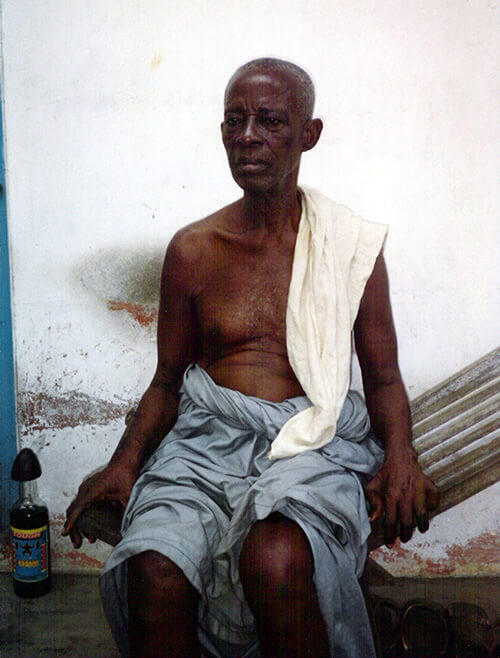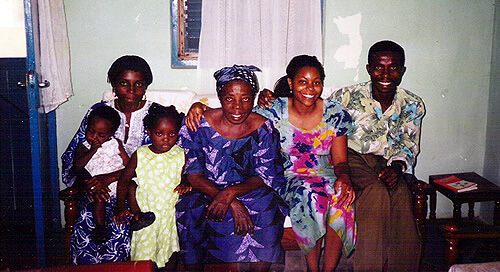A Question of Tradition
Story and photos by Kim Foote

Akan priest in Ghana
The Atlantic Ocean is heard but not seen. The only light that illuminates the evening is two bulbs dangling between wobbly poles. Beneath a canopy, drummers warm up on large, upright talking drums.
A young woman is to be initiated into the traditional priesthood in Komenda, a rural fishing village on Ghana's coast, and we're waiting for the ceremony to begin. Everyone's eyes, including mine and my classmates, are focused on the row composed mainly of women sitting opposite us. They've removed their shoes. Some of them wear black-and-white beaded necklaces and bracelets. Wofa, my Ghanaian program leader, informs us that they're akomfo, Akan priestesses and priests.
I'm excited about investigating spiritual concepts my African ancestors might have known. A few of my black classmates, also desiring the knowledge, accompanied Wofa and me on interviews with two of Komenda's eldest okomfo, who invited us to the ceremony. Wofa remarked that the exchange students have never been so passionate about the Fante language lessons and Ghana's culture. To many of us, it's obvious why. Thirteen of us are African American. For us, this semester abroad isn't some exotic adventure. It's about digging up the roots of our African ancestry. It's about finding a culture that centuries of our ancestors' enslavement has diluted or erased.
I hope to witness some of that authenticity at the initiation ceremony, but I'm anxious about what will unfold. The akomfo I interviewed vowed to heal with herbal medicines, summon rainfall, and invoke an obosom, or deity. When an obosom embodies a priest, they can interpret the messages of Onyame, the Akan supreme god.
But would the ceremony reveal anything genuinely traditional? Komenda is overwhelmingly Christian in southern Ghana. My classmates and I were shocked to learn that one of the akimbo — who everyone says knows the most about the old ways — attends church occasionally. I've also noticed that Ghanaian and Nigerian-produced pop videos portray indigenous spirituality as evil and dangerous. Characters consult "fetish priests" or "voodoo doctors" who cast spells, complete with beheaded chickens and cheesy special effects.
Still, I was surprised to see so many people at the ceremony. I hesitated to tell my devout Christian host family in Komenda about it. Yet, my host sister urged me to go. She, who disparaged traditional puberty rites, raved about akomfo walking through fire and swallowing dogs' eyes and whole eggs. "You must tell all your family back home in America," she said, eyes glowing. .

An hour after our arrival, nothing much has happened except for some half-hearted drumming. I've put boredom at bay by people-watching. Wofa advised us not to bring cameras since they'd be viewed as a sign of disrespect, so I made careful observations to jot down later.
One of the people who catches my fancy is a Ghanaian boy with a head full of sun-bleached dreadlocks. He sits with other children on the sandy ground. The dreadlocks surprise me since they seem to have a negative connotation: Ghanaians associate them with Rastas, stereotyped as "wee"-smokers. The boy also has fascinating facial cuttings. Straight lines radiate from the corners of his mouth and eyes. I ask Wofa what his hair and cuts signify.
"We have some babies here," Wofa says, "whose hair just naturally goes that way, even though we are combing it. That is the initial sign that either he is an ancestor reincarnated, or that an obosom has called him from birth to serve it."
The priestesses' hairstyles also capture my attention. Most of them wear braided extensions or have twisted, braided, or looped their hair with black thread. One arrives with her baby secured to her back. She's wearing pink foam rollers, as though she just came from the beauty shop! My classmates and I look at each other wide-mouthed. We can't help but giggle at this unexpected snippet of Westernization. So much for tradition.
One of the few male priests present also becomes a spectacle for us. Something about him strikes me as odd, and I realize it's his head wrap. I've seen plenty of Ghanaian women wearing head wraps, but no men. Hands on his hips and behind poked out, he chatters in Fante with the priestesses, flapping his hands about for emphasis. He could be the male beautician who works in a women's hair salon! I'm reminded of a documentary about Vodun spiritual practices in Haiti. When a female deity embodied a priest, he adopted feminine mannerisms. He even donned a dress and women's jewelry as he danced.
I turn to Wofa and ask in a whisper if this is the case with this okomfo. He gives me a funny smile and shakes his head, saying, "He just behaves that way-o. I do not know why."
Just as all of us start to get fidgety from the inactivity, a tall priestess who looks to be in her 70s picks up a metal bowl full of a white powdery substance that has a sweetish smell. Wofa tells us that it's kaolin. The priestess uses it to draw a large circle in the sand. She makes a small circle near the drummers and draws an X through it. Wofa explains that the circle is a potent symbol in traditional African spirituality. Here, it ensures that anyone who enters it will be safe from evil spirits' interference.
The drumming picks up, and the akomfo march over to my classmates and me. They shake our hands from right to left, as Akan custom dictates, saying "Yaa ahenewa" or "Yaa abrow" — formal greetings based on their clans. After they return to their seats, Wofa tells us to follow him. We cross the circle, shake their hands from right to left, and return to our bench.
A priestess grabs a foot-long, palm-fiber broom and begins dancing around the circle. Bent forward with her back straight, she waves her arms and twirls the broom as she dances and kicks out her feet. Her feet land so hard that I feel the ground vibrating as she passes. She taps the broom on the ground in front of the other akomfo and goes to face the drummers, who halt their beating to bow.
After a few more akomfo had danced with the broom, my classmates and I exchanged glances. With our drooping eyelids, no words were needed. I was about to tell Wofa we were ready to leave when a heavyset priestess danced in fast circles like she weighed 100 pounds. The one in the pink rollers, who sits on the bench across from us, started bouncing wildly.
An elderly priestess jumps from the bench, ringing two bells. She rushes over to the one with the pink rollers, some of which now lay scattered on the ground, and passes her baby to another priestess. She takes the younger woman's arm and leads her out of the area. My classmates and I whisper to each other, wondering what's happening. We ask Wofa, and he tells us we've just seen an obosom enter her body.
A few minutes later, the young priestess returns without her rollers. Her permed hair has been combed into a bob, but that's not her biggest change. She's now wearing a long white cloth tied over her chest. Kaolin is smeared across her exposed upper body and face. Her eyes are half-closed and fluttering. She dances around the circle, emitting a soft, high-pitched sound like "whooh!" Suddenly, she spins in circles and plops herself onto the lap of one of my classmates, who gasps. Wofa chuckles and tells us that this obosom must be in a playful mood.
My classmates and I are fully awake now, but it's midnight, and Wofa advises us to go. We protest. He laughs and informs us that the priestess to be initiated won't appear during the ceremony until later in the week.
On the trek to our homes, which requires flashlights in a village that boasts a prosperous sugar factory, streetlights, and paved roads in the '80s, I try to process the evening. I'm wondering about the tradition I've hoped to find in Ghana, considering I've just seen a "traditional" priestess with permed hair and pink rollers!
What is more authentic: an indigenous ceremony sprinkled with Western elements or Africanized Christianity? I've witnessed Ghanaians dancing to the tithing box in church and a Ghanaian Catholic priest boogying down the aisle with drummers, among other things! Which spiritual expression should I deem more valid?
My Komenda host brother, a chemistry teacher, and a Methodist, told me that though he doesn't doubt the existence of the abosom or the power of akomfo, he doesn't promote it. "The work of akomfo has always been surrounded in secrecy, and only a select few have access to the knowledge base," he told me. "As a scientist, I am trained to seek answers. As a Christian, I am trained to seek the truth."
Could altering some traditions be a good thing?
Kim Foote first visited Ghana as a college student in 1999 and returned as a Fulbright Fellow, 2002-03. "A Question of Tradition" is excerpted from a memoir-in-progress about her experiences there. Excerpts have also appeared in Homelands (Seal Press, 2007), MoAD's online Stories Project, and Black Arts Quarterly. She received an MFA in Creative Writing from Chicago State University.
|
